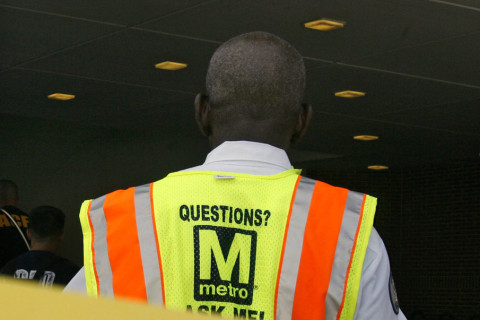WASHINGTON — Metro and its largest union were set to begin negotiations over disciplinary policies on Monday – the two sides are expected to haggle over how to reprimand workers for violations that range from wearing the wrong uniform to sleeping on the job.
At issue is a disciplinary code that Metro imposed last year without negotiating first with the union. The code applies to both rail and bus employees and counts any violation toward an escalating reprimand system.
Among the concerns of union officials — how the policy treats the many variations of sleeping on the job.
“A Station Manager who closes their eyes and appears to be asleep while seated in a kiosk is subject to the same discipline as a bus or train operator who appears to fall asleep while the vehicle is moving,” Amalgamated Transit Union Local 689 wrote in a motion this month aimed at forcing Metro into negotiations.
An arbitration panel temporarily threw out parts of the disciplinary matrix earlier this year, finding that some significant parts of the policy needed to be negotiated with the union rather than simply imposed by Metro. Metro has sued to overturn the findings.
That case is now temporarily on hold for a few months while the two sides negotiate. The union told WTOP an initial meeting was scheduled for Monday.
The union said at least 18 other arbitration cases are on hold until this overarching case is resolved, including one case where an employee was fired due to the escalating discipline that, under the new policy, applied across several different violations.
Grievances filed include one by a bus operator suspended three days for eating a piece of candy while driving, and another by a bus operator with several stop sign camera tickets.
A disciplinary matrix
In the past, discipline for a violation of one type generally did not carry over to add onto the discipline for another type of violation.
Under the policy, every violation was classified as general, serious safety-related or critical safety-related.
General violations had four progressive steps of discipline, followed by termination. Serious safety-related violations had three, and critical safety-related had just two.
The union argues that two general violations for something as minor as wearing the wrong uniform plus a single critical safety violation should not necessarily lead to a worker being fired.
The union is also in general contract negotiations with Metro, and has become much more vocal publicly in the last month or two.
One group of employees, one policy
Transcripts of arbitration hearings in the disciplinary policy case show that Metro management’s attempt to uniformly apply discipline across the agency is part of an effort to resolve a high level of distrust of supervisors by Metro employees.
A senior labor relations officer at Metro, Winston Ellis, said it was also an attempt to deal with workers bouncing back and forth between bus and rail operations to avoid getting fired.
“Once you take a step back and look at it, they’re all the same group of employees,” he said.
“I cannot tell you the number of times that in talking to managers, employees, union representatives, it was quite known that employees on the bus side, who in fact may have developed poor operational records, were either correctly or incorrectly advised, that you may have a better chance of surviving if you go over to the rail side, as soon as you get a chance and try your hand over there. Because you’re not necessarily long for bus,” he added.
Ellis was involved in the multiyear process to develop Metro’s new disciplinary plan. He said the union was only provided with the details in the months before the changes were implemented.
Metro addressed several concerns from the union, but the union argues it was not enough.
A union lawyer said the disciplinary policy, for example, had at least six different references to variations of sleeping on the job.
A union arbitration brief argued, “for example, an operator dozing while stopped at a traffic light may not be as serious as an operator dozing at the controls of a moving Metrorail train.”
Ellis told arbitrators that supervisors can still handle some things on a case-by-case basis.
“They have special factors that could have entered into the circumstance. The person may not have been in a sleep mode, but had just been, you know, had just recently closed their eyes. So the things that superintendent is asked to look at, are all things that help to establish the context in which that case is looked at,” he said.
But when Ellis came from New York in 2009, he said many supervisors did not know how to handle discipline.
“It was quite evident that those things were in many instances not being done to the full extent that the organization should have been requiring,” he said.







